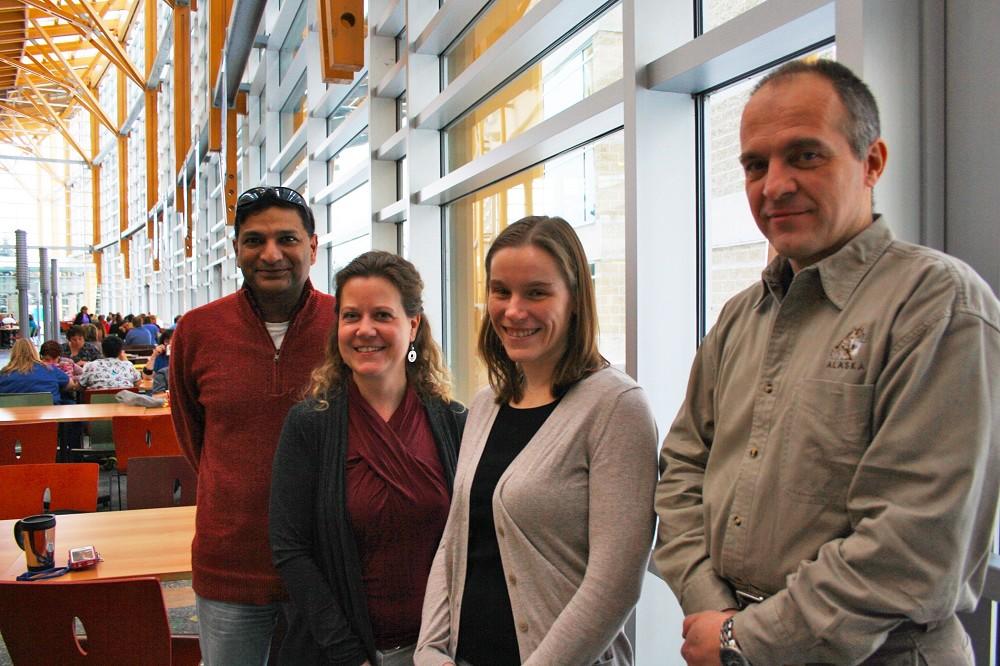New Stroke Rehab Research in Thunder Bay to Improve Hand Function
by Graham Strong
 Vineet Johnson (from left), Kirsti Reinikka, Dr. Jane Lawrence Dewar, and Dan Vasiliu are part of a multi-organizational research project (including Lakehead University, St. Joseph’s Care Group, and the TBRRI) that is developing a device to help improve hand function for stroke survivors.
Vineet Johnson (from left), Kirsti Reinikka, Dr. Jane Lawrence Dewar, and Dan Vasiliu are part of a multi-organizational research project (including Lakehead University, St. Joseph’s Care Group, and the TBRRI) that is developing a device to help improve hand function for stroke survivors.It’s easy to take hand function for granted – until you no longer have it. Everything changes, from brushing your hair and teeth to feeding yourself and even going to the bathroom alone.
Many stroke survivors know this all too well. It can take months of rehabilitation to recover fine motor coordination, and many stroke survivors continue to experience limitations in hand function.
In a joint collaboration between several organizations, a team of researchers is investigating ways to help stroke survivors recover more hand function than ever before. Dr. Jane Lawrence Dewar, a scientist at the Thunder Bay Regional Research Institute (TBRRI); Kirsti Reinikka, a physiotherapist with St. Joseph’s Care Group; Vineet Johnson, a physiotherapist and neuroscientist at Lakehead University; and Daniel Vasiliu, an independent engineer, are developing a complex yet low-tech solution that will be available to most people including those in third-world countries.
“In essence, what we are trying to develop is a community-based program for stroke survivors focused strictly on regaining hand function,” said Reinikka, who is the coordinator of an existing community-based stroke program located at and supported by the Canada Games Complex.
Using a blend of science, instrumentation, and current rehabilitation methods, the first phase of the research will determine what contributes to improvements in hand function after the initial 20-week recovery period. The system would use an ingenious portable device that can easily be adjusted to customize exercise regimens to each stroke survivor’s unique goals and abilities. The aim is to create a device the individuals can use at home, guided via the Internet by a physiotherapist hundreds or thousands of miles away.
“The device will have two-way communications so that a physiotherapist can get feedback from the device on how well the patient is doing, and change the exercise regimen remotely,” said Vasiliu, who is developing these devices jointly with Johnson. “They can change resistance, number of repetitions, complexity of the task, and so on.”
There are robotic solutions also trying to solve the same problem, though they cost tens of thousands of dollars and are not portable. The Thunder Bay-developed device, on the other hand, will be truly portable and could cost as little as $20.
“If you think of a robotic device, it’s a very complicated system. Every time something fails, it costs time and money,” said Johnson, who has extensive experience in robotics-based rehab. “The low-tech solution is less likely to break down, and usually you can fix it yourself if it does.”
Dr. Lawrence Dewar’s research will play an important part in developing the prototype. Using functional magnetic resonance imaging (fMRI), she will be able to map areas of brain activity. The team aims to identify exercise-induced changes in brain activity by conducting imaging before and after the community-based hand training program.
“We can see what areas of the brain they are using while working with the device,” Dr. Lawrence Dewar said. “It will be interesting to find out whether or not those areas are different after training when they are able to use the device more efficiently.”
Thanks to all those who donated to Dr. Lawrence Dewar’s work through the Thunder Bay Regional Health Sciences Foundation’s Health Sciences Discovery Fund, which helped make this further research possible. Support local research by donating online (healthsciencesfoundation.ca) or by calling the Health Sciences Foundation at (807) 345-4673. Together, we’re building a healthier, wealthier, and smarter Northwestern Ontario.